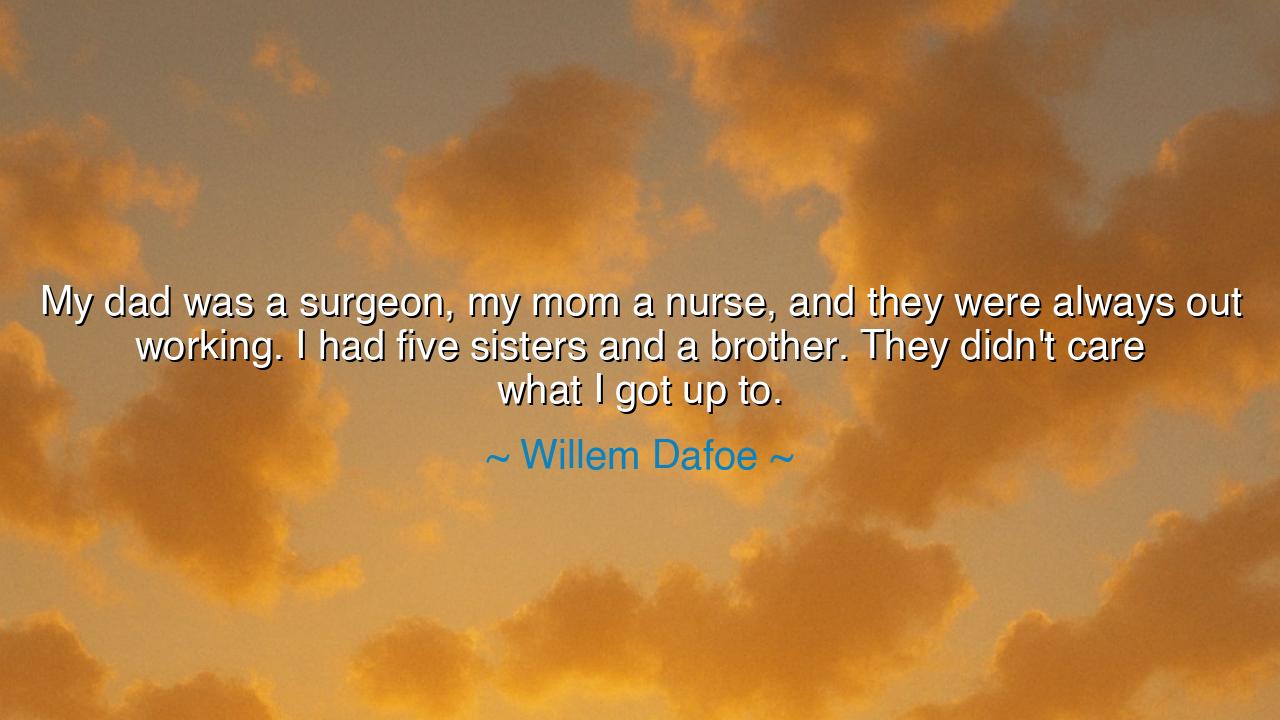
My dad was a surgeon, my mom a nurse, and they were always out
My dad was a surgeon, my mom a nurse, and they were always out working. I had five sisters and a brother. They didn't care what I got up to.






When Willem Dafoe said, “My dad was a surgeon, my mom a nurse, and they were always out working. I had five sisters and a brother. They didn’t care what I got up to,” he spoke with the tone of reflection — not resentment, but understanding. His words are the remembrance of a childhood lived in independence, in the wide and sometimes lonely space between freedom and neglect. Beneath their simplicity lies a deep current of meaning: that from solitude is born self-reliance, and from the absence of guidance, the hunger to explore one’s own path. Dafoe’s life, wild and fearless, is the fruit of that early liberty.
The origin of this quote comes from Dafoe’s recollection of growing up in a large, busy household in Wisconsin. His parents were dedicated healers — a surgeon and a nurse, serving their community with the tireless devotion that medicine demands. In that calling, they often had little time for their children’s daily adventures. The young Willem, surrounded by six siblings, learned early that the world was his to navigate. He was not sheltered by constant supervision or confined by rigid expectations. Instead, he grew amid the chaos and freedom of a bustling family where responsibility fell to the individual. Out of that freedom was born a curiosity unbound, a daring spirit that would later define his art and his life.
In the ancient sense, his story recalls the children of heroes and wanderers — those who grew up in the absence of guiding hands, learning to rely on their own instincts. Consider Odysseus’s son, Telemachus, left without his father for twenty years. Surrounded by disorder, he had to find his own courage, to stand and seek his destiny in the face of uncertainty. So too, Dafoe’s early independence forged within him a certain wild clarity, a comfort with the unknown. Without the constant direction of parents, he learned to listen to the quiet compass of his own heart. This is a truth the ancients knew well: that strength is not only inherited through nurture, but awakened through necessity.
When Dafoe says, “They didn’t care what I got up to,” he does not speak with bitterness. Instead, there is the tone of a man who recognizes that freedom is a double-edged gift. It can lead one to ruin, or to greatness, depending on how it is used. For some, such neglect breeds resentment and aimlessness. For others, it awakens creativity, rebellion, and the courage to live without apology. Dafoe was of the latter kind. In that open field of childhood — unsupervised, unstructured — he found the seeds of the performer he would become: bold, strange, unafraid to explore the edges of human experience. His later roles, filled with intensity and rawness, reflect that same inner wildness that was never tamed by the watchful eye of authority.
There is, too, a quiet reverence for his parents hidden in his words. Though they were absent, they embodied a higher form of care — devotion to duty, the kind of work that heals others even at the cost of personal presence. His father, the surgeon, wielded precision and control; his mother, the nurse, offered compassion and strength. From them, Dafoe inherited not their professions, but their essence: discipline and empathy, qualities that would temper his freedom with depth. Thus, what began as neglect became balance — the child’s independence shaped by the example of the parents’ integrity.
In this, his story mirrors that of many who come from large, busy families or demanding homes. The world becomes the teacher, and the heart learns resilience. The child learns to find meaning not in attention, but in action — to make something of himself in the vastness of being left alone. Dafoe’s art is the echo of that lesson: that identity is not given; it is forged. He grew not under constant care, but under the wide sky of trial and imagination. And in that space, he discovered the soul of an artist — one who could walk fearlessly through light and shadow alike.
So, my child, take this wisdom from Willem Dafoe’s words: do not curse the emptiness of your beginnings. If life grants you freedom, use it with purpose. If it denies you guidance, let curiosity become your teacher. The absence of supervision is not the absence of love; sometimes it is the universe’s way of telling you to grow strong on your own. From solitude comes self-knowledge. From freedom comes responsibility. And from the silence of unattended youth can rise a voice powerful enough to move the world.






AAdministratorAdministrator
Welcome, honored guests. Please leave a comment, we will respond soon